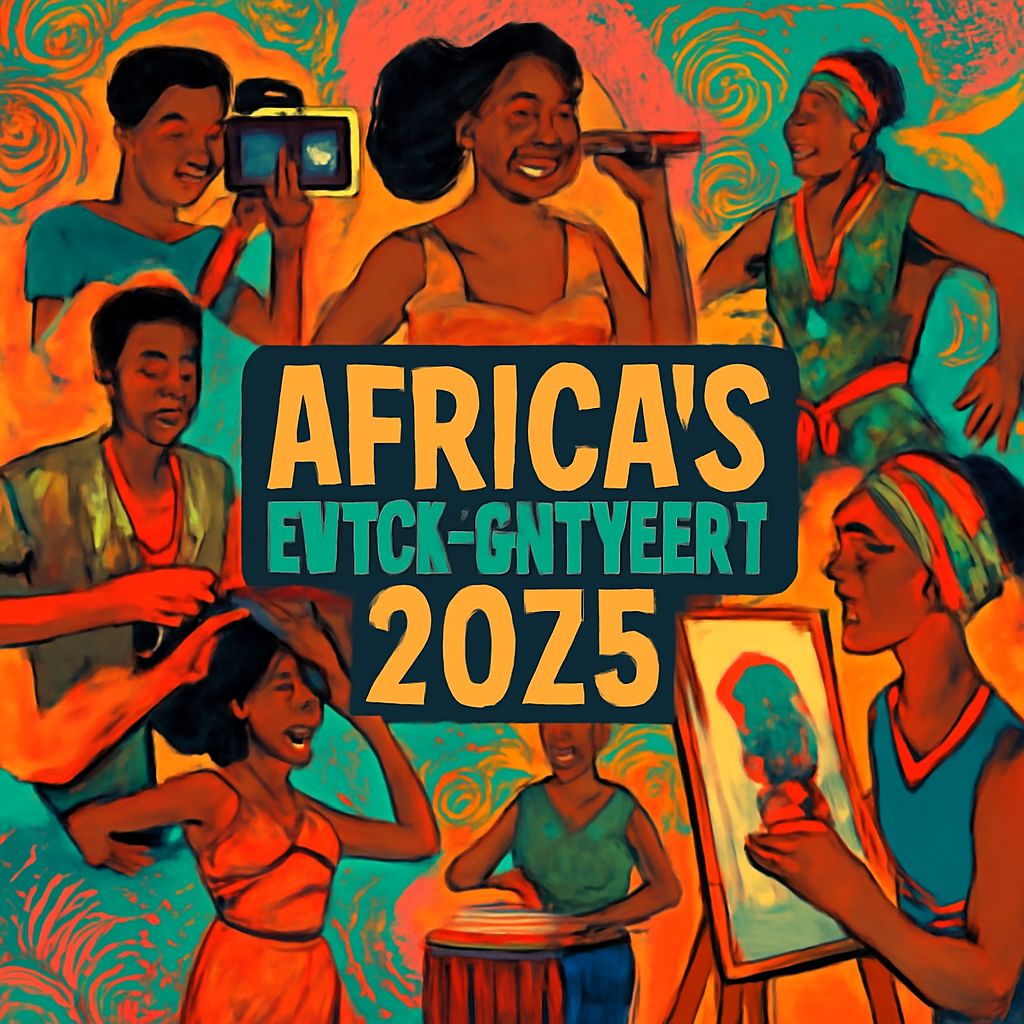Africa’s entertainment industry is buzzing in 2025, with film, music, sports, and cultural festivals lighting up the continent. From Nigeria’s Nollywood to Morocco’s historic football matches, each country brings its own flavor to the table. Let’s dive into what’s happening in Ghana, Nigeria, South Africa, Kenya, Morocco, Egypt, and Tanzania, and why this is such an exciting moment for African entertainment.
Nigeria: Nollywood’s Global Push and More
Nigeria’s entertainment scene is a powerhouse. Nollywood, the country’s film industry, is making history with My Father’s Shadow set to premiere at the Cannes Film Festival, a first for Nigerian cinema. Despite unverified chatter on X about Netflix scaling back due to a $14 million scam by producers (take that with a pinch of salt), Nigerian films are dominating streaming platforms like Netflix and Prime Video, rivaling South African content.
Music is just as electric. Grammy-winning artist Tems rocked Lollapalooza in Paris this July and is now hosting an event in Lagos to empower young women in music, a move that’s inspiring a new generation. On the sports front, Nigeria’s Super Falcons are in the Women’s Africa Cup of Nations (WAFCON) final against Morocco, chasing their 10th title. Add to that the Professional Fighters League’s first African event, featuring Nigerian fighter Juliet Ukah, and Nigeria’s entertainment landscape is bursting with energy.
Ghana: A Blend of Sports, Art, and Ambition
Ghana’s entertainment scene is a vibrant mix of sports, music, and art. The Black Queens, Ghana’s women’s football team, reached the WAFCON semifinals, putting up a fierce fight against Morocco before falling 4-2 on penalties after a 1-1 draw. Players like Josephine Bonsu and Chantelle Boye-Hlorkah won hearts with their grit. In the art world, painter Amoako Boafo is gaining global acclaim, his work a bold celebration of Ghanaian culture.
Music thrives too, with the diaspora amplifying Ghana’s influence—think viral moments like the video Ghana gives me more than football. Behind the scenes, there’s talk of influential families shaping the industry, adding a layer of intrigue. Ghana’s creative scene feels like it’s on the verge of a major breakthrough.
South Africa: Grit, Talent, and Drama
South Africa’s entertainment industry is a force to be reckoned with. Its films are reportedly outpacing other African content on streaming platforms, cementing its dominance. But it’s not without drama—Kenny Kunene, a political figure, is embroiled in controversy over DJ Sumbody’s murder, gripping public attention.
On the field, South Africa’s women’s team, the defending WAFCON champions, fell 2-1 to Nigeria in the semifinals, but stars like Jermaine Seoposenwe and Hildah Magaia showed incredible heart. Community initiatives, like the Mitchell’s Plain Youth Safety Programme, blend music and arts with social impact, proving South Africa’s creative output is as meaningful as it is dynamic.
Kenya: Film, Fitness, and Activism
Kenya’s entertainment scene is gaining momentum, driven by film and activism. The Africa Film Finance Forum, set for September 2025 in Lagos, will feature Kenyan creatives working toward a $20 billion Pan-African film market. Meanwhile, bodybuilders in Nairobi’s Mathare neighborhood are grabbing global headlines, blending fitness with entertainment in a fresh way.
Activism adds another layer, with Boniface Mwangi’s recent charges over antigovernment protests sparking conversations about creative expression and politics. With a 42% internet penetration rate, Kenya’s digital scene is growing fast, and streaming platforms are amplifying local stories. Kenya’s definitely a space to watch.
Morocco: A Cultural and Sporting Hub
Morocco is shining as a cultural and sporting hotspot. Hosting the 2024 WAFCON (played in 2025), their Atlas Lionesses are facing Nigeria in a historic final, a match that’s got everyone talking. Goalkeeper Kawtar Bentaleb calls it a game-changer for women’s football. Beyond sports, the Ahidous National Festival in the Atlas Mountains wove Amazigh music, storytelling, and games, drawing global crowds.
With a 3.4% GDP growth in 2024, Morocco’s economy is fueling its entertainment and tourism boom. Some whisper about “dollar diplomacy” boosting their cultural influence, but that’s more speculation than fact. Morocco’s magnetic vibe is undeniable.
Egypt: Sports and Cinematic Ambition
Egypt’s entertainment scene is thriving, with sports and cinema leading the charge. Hosting the CAF U-20 Africa Cup of Nations in 2025, Egypt’s team beat Tanzania 1-0 to reach the quarterfinals. The Suez Canal Economic Zone is eyeing $60 billion in green investments, which could supercharge film infrastructure.
With over 50% internet penetration, Egypt’s digital entertainment market is robust, and local content is getting major play on streaming platforms. Egypt’s blending its ancient storytelling heritage with modern flair, and it’s working.
Tanzania: Quiet Growth with Big Potential
Tanzania’s entertainment scene is quieter but steadily growing. Their women’s football team gained valuable experience at WAFCON, and player Clara Luvanga’s meeting with Al-Nassr’s Ronaldo was a proud moment. Ocean conservation efforts, like sea cucumber farming, are being spun into cultural stories that mix entertainment with purpose.
With a 25% internet penetration rate, digital growth is slower, but Tanzania’s $79.16 billion GDP in 2024 supports music and local festivals. With elections in October 2025, expect music and rallies to take center stage.
The Bigger Picture
Africa’s entertainment scene in 2025 is a dynamic blend of digital innovation and cultural pride. Nigeria, Ghana, and South Africa lead the way with strong internet access (51%, 53%, and over 30%, respectively), fueling streaming platforms that put African stories on the global map. Women’s football, especially WAFCON, is uniting fans and showcasing talent. Cultural festivals, from Morocco’s Ahidous to Tanzania’s eco-stories, weave tradition with modern appeal. Yet, challenges like political protests in Kenya and scandals in South Africa keep things real and complex.
Africa’s entertainment industry is a vibrant tapestry, and 2025 is proving to be a pivotal year. What’s your take? Drop a comment below, and don’t forget to share this post!



